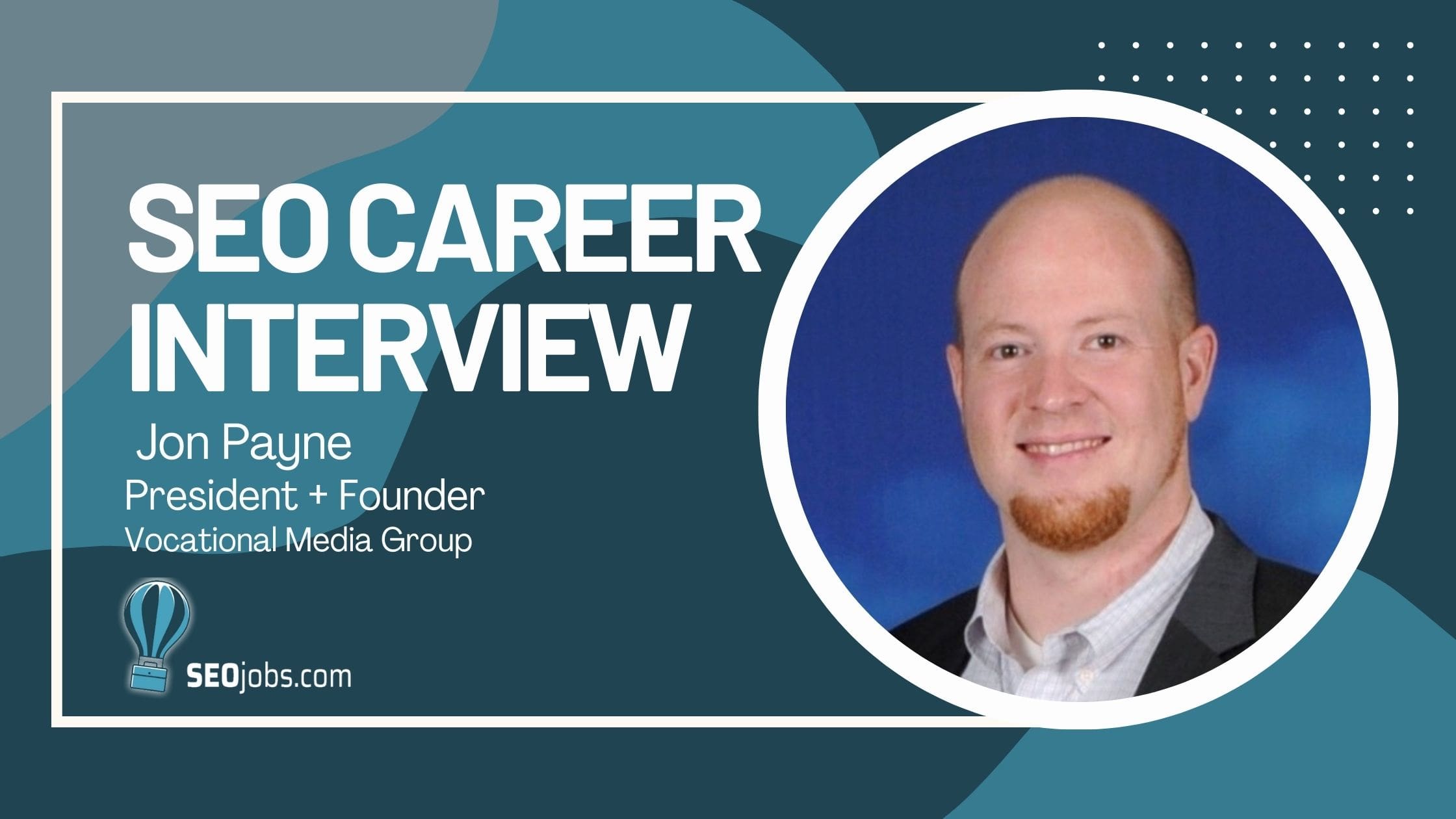Hi! 👋 We’re so glad to feature you on SEOjobs.com. Please introduce yourself to our site’s readers.
Hello! My name is Jon Payne (Twitter | LinkedIn) and I live in the town of Fort Mill, SC, which is a suburb about 15 minutes outside of Charlotte, NC. I’ve been in the SEO space since about 2003, which is also the same year I graduated from college. So it’s been a long run thus far!
Please share with us your current SEO role and for what company you work for:
I’m the President & Founder of Vocational Media Group, which is essentially a holding company for several different small internet-based businesses. We’re basically in three different businesses: 1) niche content sites, 2) Amazon FBA private label brands, and 3) agency services where we help businesses with both of those things – growing traffic on Google or growing sales on Amazon.
Its a bit jumbled and not quite as focused as it probably should be, but I suppose in that way its also a very authentic reflection of me as the founder! And really the foundation for all of it though is optimizing for search. Be it search on Google or on Amazon. Be it for our clients or our own in-house brands.
Can you share with us how you entered the SEO industry?
After high school I went to college at Towson University, just outside of Baltimore, MD. I initially went to college thinking I wanted to be a Physical Therapist but quickly changed to a business focus when I found myself constantly thinking about how I could scale my own PT practice and get out of the actual operations. It was the game of business that I really enjoyed. Towson actually had an E-Business degree, which was quite rare for that time. I double-majored in E-Business and Marketing.
I was a pretty focused student, and in true geek fashion in my spare time, I started learning HTML. This was from 1999 to 2003, so tools like WordPress or even decent HTML editors didn’t exist then. I just thought it was cool how you could build a web page and get it to do things. First I built HTML files in Notepad and then learned Microsoft FrontPage and Macromedia Dreamweaver (now Adobe). I wanted to make a site do something – not just sit there – so I played around a bit with MS Access databases too, and learned a bit of ASP and PHP as well. This was just fun and interesting for me. We didn’t really get into much of this in my classes in the E-Business program, which was a disappointment. But in hindsight, I think the space was so new at that time that there weren’t instructors around who could teach it and it would have been tough just identifying which tools or technologies to focus on. And now I’ve come to a different line of thinking on this too – that college is more about learning how to think critically rather than learning specific technical or career skills.
Quick sidenote… my own career exploration in college actually inspired me to build one of my firm’s in-house brands, The Career Project.
So in college, I interned at two very different companies, which sort of set my path for the rest of my career.
My first internship was at Black & Decker, which is a huge company and is headquartered in Towson where I went to school. As an intern, I had a very tiny role and really no autonomy in my work. It was cool to say I worked there, but what I was doing was pretty boring and not conducive to growth. It also felt very “clicky” to me, for whatever that is worth
I quit that internship at Black & Decker to accept another internship at a very small company called Brave New Markets. They were a marketing agency specializing in “e-Business”. It was literally just two guys in their 40’s working on the top floor of a small converted house. I was employee #3 working maybe 20 hours a week. I remember when I told my advisor that I was going to leave Black & Decker’s corporate headquarters where I made like $18/hr to instead work with 2 guys in a small brick house and take a $5/hr pay cut – she was both puzzled and a bit upset with me. She had arranged the internship program with Black & Decker and it was a point of pride for the department. But I just knew that it wasn’t the path that was right for me.
Looking back, I made the right call. I learned so much at Brave New Markets. I actually got to do meaningful work. I attended client meetings. I ran email marketing for our largest client and first got into SEO here.
I think the lesson for others is maybe two-fold. First, I think internships and perhaps the first 2-3 years of your career are a great time to try different things. Learn what you like and what you don’t – not just the work itself but also the environment. For me, the small business and agency environment just felt right. The corporate environment did not. The second lesson is to maybe have a bias for smaller organizations early on, as since there are less hands this often means there is more to do and you can take on more responsibility, grow faster, etc.
Okay back to the internship story now. After I graduated, the agency offered me a full-time job. I don’t recall the salary but it was fair. I turned it down. The reason is that they wanted me to also branch out and do print advertising, radio ads, etc. as they were a bit more than just a digital agency. And this was on the heels of the dot-com bust too. I was young at the time and thought it a better career move for me to focus on digital. So I kept working there part-time for maybe six months while starting up my own agency, Ephricon Web Marketing. I went full-time with Ephricon in late 2003 and grew that agency over the next 10 years. We were almost entirely focused on organic SEO the entire time.
How did you start to learn SEO? What are you currently doing to keep up with the ever changing SEO industry?
I started so long ago that it’s not quite where I would recommend one start today. Most of the sites and resources probably no longer exist or are outdated. But in the early 2000’s it was all about forums and blogs. I remember the DigitalPoint forum and Webmaster World getting a lot of my time. Plus I had several clients and my own sites too and so I would tinker around. Read about something on a forum, then give it a try and see what happens on a given site.
With regard to blogs, SEOBook and SEOmoz (now Moz) were big. I had quite a list but can’t remember them all. I also went to a few early conferences in the space like PubCon and Search Engine Strategies.
Maybe my favorite tactic was networking. Specifically, I started a group on Meetup.com for people interested in SEO in the Baltimore area. This was a great way to discuss tactics more in-depth, and meet potential partners, employees, clients, etc. I would even reach out to other people I found online and just ask to do lunch. The space was so small at the time that you had to be resourceful. When I first started in the early 2000’s, I could count everyone in my metro area that did SEO professionally on one hand.
Nowadays the problem is the opposite. Instead of not enough information, its too much information. So the challenge is learning to filter. I have a few good friends in the space who I touch base with and share notes with. And then I have a curated list of outside sources. I like Matt Diggity’s Youtube channel. I like Spencer Haws’ Niche Pursuits blog and podcast. And I follow what Niche Website Builders, and Mushfiq Sarker are doing in the affiliate SEO space. And of course, the SEO for Lunch newsletter by Nick LeRoy. All of these sources do a nice job of filtering for me. Then the key is to take the concepts and ideas and test them out on your own sites.
Can you share what factors are most important to you in an SEO career and why? When do you know it’s time for a new job? Do these same factors play a role?
I’m an entrepreneur at heart and have barely ever held a job, so my response might be quite skewed and different here than most. For me, working for myself and running my own businesses is mostly about freedom. Freedom of time, and autonomy of work. I suppose variety goes along with this too. Basically every day I work on whatever I decide to work on that day. This is both a blessing and a curse! So absolutely freedom of time, location, and control over my day is my top priority.
The second is compensation. I have a family to support and I’ve been fortunate to this point where we’ve been quite comfortable in this respect, which frees me up to spend my mental energy on other things.
What recommendations would you give to someone who is looking to join the SEO industry and get their first full-time SEO position?
I’ve hired about 20 to 25 people for SEO roles. Far and away the most important thing to me when hiring is to see “demonstrated interest”. If you ask people if they are interested in SEO they will say yes. But someone who is really interested can prove it. They have hobby websites they are working on. Maybe the sites are ugly. Maybe they don’t make much income. But they demonstrate interest. If you don’t have at least one website that is yours right now that you can point to, experiment with, etc. then go start one. Over time it could possibly even become a nice secondary source of income or more.
My second piece of advice would be to reach out to people who are in positions you want to be in and just ask them if you can treat them to lunch (SEO FOR LUNCH!), buy them a coffee, or even get 20 minutes of their time. I think this is best done physically – old school style – rather than just virtually. When you do meet with these people, come prepared and take notes on how you can help them. Then follow up and keep in touch so you stay top of mind. Many people will oblige as they want to help others succeed.
And now here’s a third recommendation… if possible, seek out opportunities to become a specialist in a given platform. When I started 20 years ago, doing SEO, in general, was very niche. But nowadays Google SEO is no longer a niche thing, there are tons of people in the space. If I were 22 and looking for a great path forward, I would look to brand myself as a specialist doing SEO for brands on Youtube, Amazon, Etsy LinkedIn, or even Instacart or DoorDash. Not all of those, pick one. Wherever there are marketplaces with many options, people are searching and the various brands will see value there.
As for resources, I think Matt Diggity’s content on Youtube is great in that it’s full of information and he doesn’t waste any time. For tools, I love love love Ahrefs.

